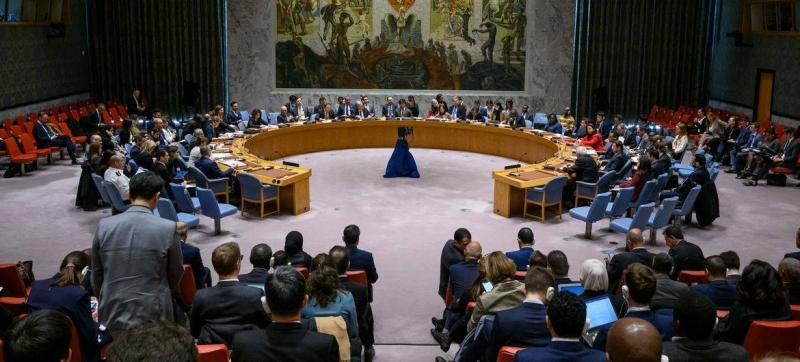With the support of 13 members and the abstention of the United States and Russia, the United Nations Security Council adopted resolution 2720 regarding Gaza and Israel. This resolution calls for "urgent actions to immediately allow for expanded, safe, and unhindered delivery of humanitarian aid and to prepare the necessary conditions for a sustainable ceasefire." The U.S. representative to the Security Council commented on the vote, stating, "The resolution is a glimmer of hope amidst this overwhelming suffering as it allows for the unobstructed delivery of aid to Gaza." She noted that "passing the resolution was not an easy task, and we did everything we could to resolve the crisis." The British representative at the Council stated, "Seeing aid piled up at the borders and not reaching those in need is heartbreaking."
Russian Ambassador to the United Nations Vasily Nebenzya expressed before the vote, "Signing this resolution will grant the Israeli army full movement for further destruction in the Gaza Strip." Russia proposed an amendment to revert to the original text, calling for an "urgent and sustainable cessation of hostilities," but the United States opposed the amendment. The resolution received 10 votes in favor while four members abstained. The Israeli representative to the UN remarked, "The organization's focus on aid mechanisms for Gaza is unnecessary and detached from reality."
The UAE submitted the draft as an Arab member of the Council. The resolution requests the UN Secretary-General to appoint a "Senior Humanitarian Coordinator and Reconstruction Officer" responsible in Gaza for facilitating, coordinating and monitoring all humanitarian relief shipments destined for Gaza and coming from countries not involved in the conflict, verifying their humanitarian nature. It also calls for the new coordinator to promptly establish "a United Nations mechanism to expedite humanitarian relief shipments to Gaza" through these countries, in consultation with all relevant parties, to streamline and accelerate the provision of aid while continuing to ensure that assistance reaches its civilian destinations.
Furthermore, the resolution urges the conflicting parties to cooperate with the coordinator to fulfill its mandate "without delay or obstacles." The Council demanded that the parties comply with their obligations under international law to protect civilians and civilian objects, ensure access to humanitarian aid, and protect humanitarian workers and their freedom of movement. It also rejected "the forcible displacement of civilian populations, including children," and reiterated commitments by all parties regarding refraining from attacking, destroying, or removing essential items for the survival of the civilian population.
The resolution also called on the conflict parties to allow and facilitate the use of "all available routes leading to Gaza and located throughout its territory," including the full and rapid implementation of the announced opening of the Karam Abu Salem border crossing, to provide humanitarian assistance that includes sufficient fuel to meet humanitarian needs, food, medical supplies, and emergency shelter assistance "to the civilian populations in need throughout Gaza." The Council called for the full implementation of resolution 2712 adopted in mid-November and asked all relevant parties to make full use of humanitarian notification mechanisms and avoid existing military-humanitarian overlaps to protect all humanitarian sites, including UN facilities, and to assist in facilitating the movement of aid convoys.
One of the main points of contention during negotiations about the resolution adopted today was the initial suggestion by UN Secretary-General António Guterres to establish a mechanism in Gaza to monitor aid coming from non-participating countries in the war. A softened compromise was reached that instead requested Guterres appoint a Senior Humanitarian and Reconstruction Coordinator to create a UN mechanism to speed up the entry of aid to Gaza from countries not involved in the conflict. The coordinator will also be responsible for "facilitating, coordinating, monitoring, and verifying in Gaza, as necessary, the humanitarian nature" of all aid.
The Council also called on both warring parties to "commit to international humanitarian law... and condemned all attacks against civilians and civilian targets, as well as all acts of violence and hostilities against civilians, and all acts of terrorism." The UN General Assembly, consisting of 193 members, called this month for a ceasefire for humanitarian reasons, with 153 nations voting in favor of this step, but the United States opposed it in the Security Council days earlier.




